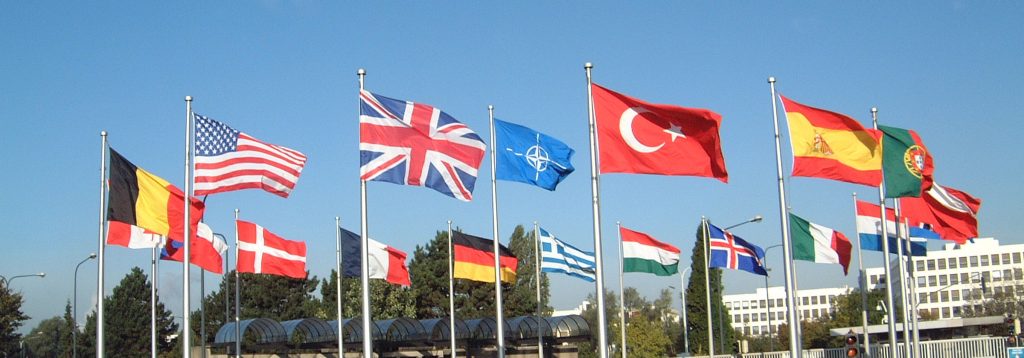
NATO’s management of the UN-sanctioned campaign to take “all necessary measures” to protect Libyan civilians is looking more futile by the day. Reminiscent of Europe’s hapless effort to assert leadership following the breakup of Yugoslavia in 1991, internal bickering has once again precluded military cohesion and made mockery of the European Union’s Common Foreign and Security Policy. Europe’s ineffectiveness is not solely of its own making, however. The US must bear part of the blame, for its historic domination of NATO has not prepared the allies for leadership responsibility.
Europe’s intervention against a third-rate military force has hardly turned the tide of battle in Libya. The rebel stronghold in Misurata remains under siege from the relentless bombardment of Muammar Gaddafi’s forces. More than 1000 people have been killed in that rebel redoubt and thousands more are being evacuated by international aid agencies. Opposition forces have appealed to NATO for increased air strikes, but the combination of operational and logistical obstacles and internal political divisions have circumscribed Europe’s response.
NATO officials rightly point out that Gaddafi’s commingling of his forces with the Libyan population inhibits their freedom to increase sorties. But that would be less of a problem if the European allies had amassed an adequate supply of precision-guided munitions and/or if they had modified their jet aircraft to accommodate US-supplied weaponry.
Even if there were no operational impediments, European political parochialism weakens NATO’s organizational cohesion and unity of command. Anxious to paper over France’s clumsy diplomacy during the Tunisian revolution and boost his sagging domestic political image, the hyperkinetic Nicolas Sarkozy pressed the US to establish a no-fly zone in Libya. He was joined by British Prime Minister David Cameron, a foreign policy tyro eager to reassert Britain’s presence on the global stage. But neither effectively consulted with other allies, including Turkey, a Muslim state that rejected air strikes. Worse, Sarkozy intentionally omitted inviting Prime Minister Recep Tayyip Erdogan to the coordinating meeting in Paris following the UN vote on Libya.
Reluctant to sending German troops into battle, German Chancellor Angela Merkel was no less skeptical of military intervention in Libya. Unlike Turkey, however, which ultimately endorsed the NATO mission, she abstained in the UN vote, embarrassingly aligning Germany with China and Russia. Because of Italy’s commercial ties to Libya and its reliance on Libyan oil and gas, Prime Minister Silvio Berlusconi, who had misguidedly fawned over Gaddafi, belatedly endorsed the UN resolution on Libya. Despite Anglo-French lobbying, however, Berlusconi has confined Italy’s participation to policing the no-fly zone rather than engaging in ground attacks. Having become the de facto dumping ground for Tunisian and Libyan refugees, Italy is also worried that Gaddafi may launch terrorist attacks on its soil because of Berlusconi’s perceived perfidy.
While NATO’s lack of policy cohesion is largely a European failing, it is also a reflection of the way in which the US has led the alliance. The US has historically paid short shrift to allied consultations; in the main, it has expected the allies reflexively to implement policies formulated in Washington. During the Cold War, senior American officials did not hesitate to invoke the potential wrath of Congress if the allies did not support US policies, implicitly reminding them that this was the price of American deterrence. Two decades after the end of the Cold War, the US has continued to encourage political dependency. Yet for all the emphasis it has placed on NATO cohesion and burden-sharing, it has not succeeded in creating the required NATO interoperability that would permit European aircraft to carry American munitions.
To avoid a protracted conflict in Libya or a political or military outcome that leaves Gaddafi in power, some believe the US should play a more visible role. This might include the return of the tank-killing A-10 Warthogs or AC-130 gunships, which were withdrawn from the Libyan operation. It could also include sending military advisors to train the ragtag rebel fighters. Mindful of the continued American presence in Iraq and Afghanistan, however, President Obama is not likely to choose either option, in part because the allies are already responding to the need for military trainers but mainly because it would contradict his decision to play a secondary role in Libya. Nor would we be doing the Europeans any favors by pulling their chestnuts out of the fire, as we did in former Yugoslavia. While the US can and should offer military assistance in the form of arms and logistical support, it is time for the European allies to shoulder the burdens of a conflict that affects their interests far more than those of the US.
President Obama’s decision to devolve leadership of the Libyan intervention to our European allies may be viewed by some as a gratuitous weakening of American leadership. But the president’s decision is a welcome departure from the overhyped notion of American indispensability. It may also be a potential harbinger of the shared security relationships that a more complex and interdependent world will require of all nations.
Hugh De Santis is analytic director at Centra Technology. He is a former career officer in the Department of State and chair of the department of national security strategy at the National War College. The opinions expressed do not reflect the views of Centra Technology or any agency of the US Government.
Image: dcnicn%203%2020%2011%20NATO.jpg
